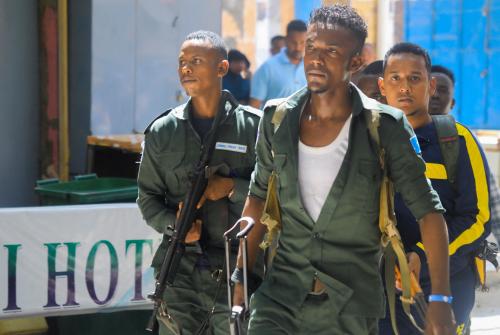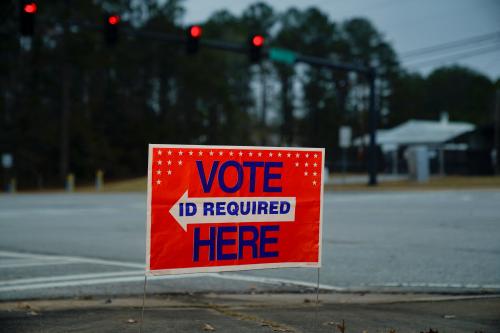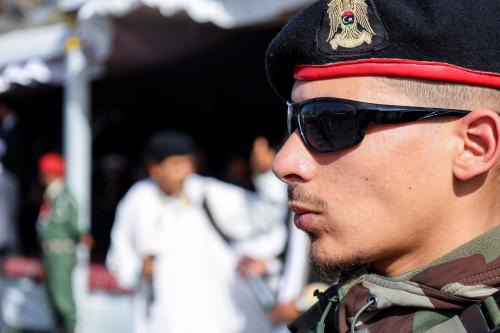I confess myself mystified by President Obama’s comments about Guantanamo this morning. Here is what the President said—with the parts I find confusing bolded:
QUESTION: Mr. President, as you’re probably aware, there’s a growing hunger strike at Guantanamo Bay among prisoners there. Is it any surprise, really, that they would prefer death, rather than have no end in sight to their confinement?
OBAMA: Well, it is not a surprise to me that we’ve got problems in Guantanamo, which is why when I was campaigning in 2007 and 2008 and when I was elected in 2008, I said we need to close Guantanamo.
I continue to believe that we’ve got to close Guantanamo. I think, well, you know, I think it is critical for us to understand that Guantanamo is not necessary to keep America safe. It is expensive. It is inefficient. It hurts us, in terms of our international standing. It lessens cooperation with our allies on counter-terrorism efforts. It is a recruitment tool for extremists. It needs to be closed.
Now, Congress determined that they would not let us close it. And despite the fact that there are a number of the folks who are currently in Guantanamo, who the courts have said could be returned to their country of origin or potentially a third country, I’m gonna go back at this. I’ve asked my team to review everything that’s currently being done in Guantanamo, everything that we can do administratively, and I’m gonna reengage with Congress to try to make the case that this is not something that’s in the best interest of the American people.
And it’s not sustainable. I mean, the notion that we’re going to continue to keep over 100 individuals in a no-man’s land in perpetuity, even at a time when we’ve wound down the war in Iraq, we’re winding down the war in Afghanistan, and we’re having success defeating Al Qaida core, we’ve kept the pressure up on all these trans-national terrorist networks.
When we transfer detention authority in Afghanistan, the idea that we would still maintain forever a group of individuals who have not been tried, that is contrary to who we are. It is contrary to our interests and it needs to stop.
Now, it’s a hard case to make because, you know, I think for a lot of Americans the notion is “out of sight, out of mind.” And it’s easy to demagogue the issue. That’s what happened the first time this came up. I’m going to go back at it because I think it’s important.
QUESTION: Meanwhile, you continue to force-feed (inaudible).
No, I don’t — I don’t want these individuals to die. Obviously, the Pentagon is — is trying to manage the situation as best as they can. But I think all of us should reflect on why exactly are we doing this. Why are we doing this? I mean, we’ve got a whole bunch of individuals who have been tried who are currently in maximum security prisons around the country. Nothing’s happened to them. Justice has been served. It’s been done in a way that’s consistent with our Constitution; consistent with due process; consistent with rule of law; consistent with our traditions.
The — the individual who attempted to bomb Times Square, in prison serving a life sentence. Individual who tried to bomb planes in Detroit, in prison serving a life sentence. A Somali who was part of al-Shabaab who we captured, in prison.
So we can handle this.
And I understand that in the immediate aftermath of 9/11, with the traumas that had taken place, why for a lot of Americans the notion was somehow that we had to create a special facility like Guantanamo and we couldn’t handle this in a normal, conventional fashion. I understand that reaction. But we’re now over a decade out. We should be wiser. We should have more experience in how we prosecute terrorists. And this is a lingering, you know, problem that is not gonna get better. It’s gonna get worse. It’s gonna fester.
And so I’m gonna, as I said before, we’re — examine every option that we have administratively to try to deal with this issue, but ultimately we’re also gonna need some help from Congress. And I’m gonna ask some — some folks over there who, you know, care about fighting terrorism, but also care about who we are as a people to — to step up and help me on it.
The President’s comments are bewildering because his own policies give rise to the vast majority of the concerns about which he so earnestly delivered himself in these remarks.
Remember that Obama himself has imposed a moratorium on repatriating people to Yemen. And Obama himself has insisted that nearly 50 detainees cannot either be tried or transferred.
True, he would hold such people in a domestic facility, rather than at Guantanamo Bay. But so what? does the President not understand when he frets about “the notion that we’re going to continue to keep over 100 individuals in a no-man’s land in perpetuity” that if Congress let him do exactly as he wished, he would still be doing exactly that—except that the number might not reach 100 and the location would not be at Guantanamo? Does he not understand his own policy proposals—to maintain a residual group of detainees indefinitely—when he worries that “When we transfer detention authority in Afghanistan, the idea that we would still maintain forever a group of individuals who have not been tried, that is contrary to who we are. It is contrary to our interests and it needs to stop”? Does he not understand when he intones that we are wiser now than we were after 9/11 and no longer need a site like Guantanamo to hold non-criminal terrorist detainees that he is proposing to build a new one?
Pardon me, but I don’t get it.



Commentary
President Obama’s Guantanamo Comments
May 1, 2013